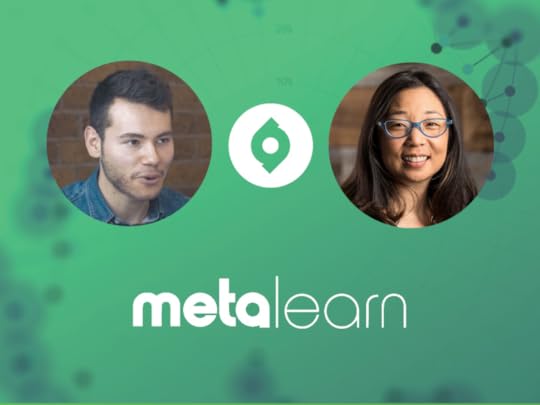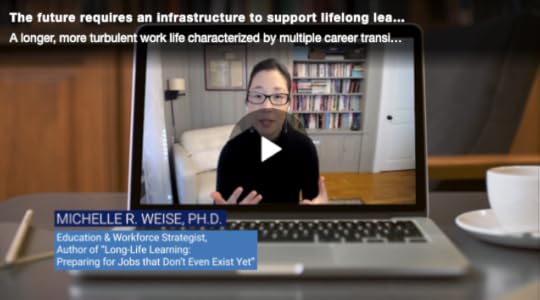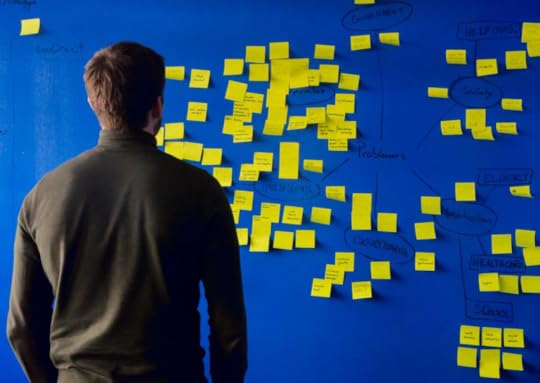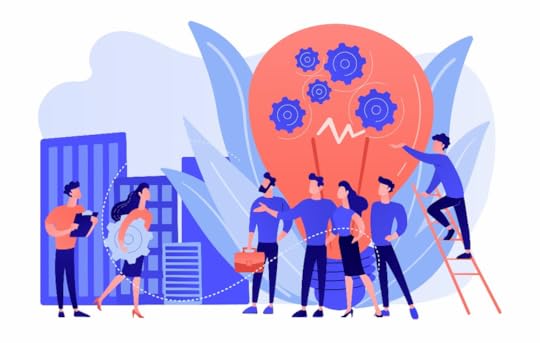Michelle R. Weise's Blog, page 3
February 27, 2021
All Things College & Career
with hosts Bobbie Ryan and Meg Gerry
We talk about #AI's role:
Helping to bridge the gap for employers to understand if a potential employee has the skill set they need.
Helping employees to feel confident that the education or training that they are pursuing will lead to work.
Refer this podcast to:
Anyone struggling to move forward in their career
Anyone needing free resources to up-skill
Career Planners/Counselors
College Planners/Counselors
Anyone in Higher-Ed
Policy Makers
Business Execs
Higher Education Administrators
February 24, 2021
On the 100 Year Career, Disruptive Education and Preparing for Jobs that Don't Exist
With Nasos Papadopoulos on his MetaLearn podcast

Discover the current state of the landscape in workplace training and higher education, the blend of skills we'll need to develop individually and as a society to thrive in the future and what you can learn from legendary Professor Clayton Christensen.
Show Notes Introducing Michelle Weise [00:36] How did school pave the way for Michelle to pursue a life in academia? [02:18] Michelle shares the best teachers she’s had in school and how their way of teaching impacted her. [03:40] What is the role of time in workforce education and how has it changed since the pandemic? What is the idea behind time poverty? [06:40] How has being good at different languages played out in Michelle’s choice of work? [08:08] Growing up in a Korean household that valued education above all, when did Michelle start to differentiate between passion and success? [10:14] How did growing up as a Korean American teach Michelle the function of language in translating ideas? [11:42] How does the education system succeed and fail at making students aware of their own passions? [13:29] What was the problem that inspired the writing of Michelle's book Long Life Learning? [14:25] How to make sense of the future of work without being overwhelmed by the thought of automation [17:17] How did the pandemic further illuminate the difficulties faced by the labour market? [18:45] What are the skills that we need to advance in our careers? How do these skills determine our value relative to machines? [20:29] What are the questions we should be asking regarding artificial intelligence and its role in the future of work? [22:14] Do we need a more blended vocational and liberal arts education system? How can university avoid sending students into underemployment, or worse, unemployment? [23:27] How does developing problem-solving skills better equip learners of any age in the workforce? [25:06] Why are employers hiring new talent instead of developing the skills of their current employees? How do management skills play into the ability to upskill? [27:17] What are present technologies that can help the workforce identify their competencies and make job seeking easier? [29:33] What are the factors that immobilise continuous learning in the workforce? How can we reconcile a market of willing learners with static and conventional learning institutions? [33:02] What is one characteristic that can make a company successful in the future? [36:42] How can communication help people differentiate themselves in an increasingly competitive labour market? [40:32] What are the things that Michelle learned from working with Professor Clayton Christensen? [42:54] Closing remarks [46:14]February 21, 2021
How to Sharpen Your Skills for Jobs that Don’t Exist Yet with Michelle Weise
In this podcast, "How To Be Awesome at Your Job" with Pete Mockaitis, you'll learn:
How to surface your hidden skills How to keep AI from making you irrelevant Nifty tools for upskilling quicklyFebruary 14, 2021
Prepare for a Job That Doesn’t Exist (yet)
First published on Skip Prichard's website .
How long do you have until you retire? Are you nearing the end of your career or just starting out? What if careers lasted for 100 years? What if education lasted, not for four years, but for your entire lifetime?
That’s what Michelle R. Weise, Ph.D. predicts and prepares us for in her book, Long-Life Learning: Preparing for Jobs that Don’t Even Exist Yet. She argues that we need to change our thinking to prepare for a soon-to-arrive future. After reading her fascinating book, we discussed her thinking and research.
“In a 100-year work life, there will no longer be a single transition from schooling to work. As we try to make sense of a longer, more turbulent work life, we must anticipate that learning and continual skill development will become a way of life.”
Before we begin, you worked with Clayton Christensen for a few years, and he had a profound influence on your work. Tell us more about how he influenced your thinking.
Clay’s theories of disruptive innovation gave me a compelling and constructive way to analyze innovations that are new and nascent, rather than dismiss or disparage them because they’re seemingly of a lower or different quality. I’ve learned that it’s precisely when we sense that very human reflex to reject that new idea, that we might need to pay attention to this new thing because it might be just “good enough” (Clay’s words) to transform an industry.
How has the digital revolution, technology advancement, and automation, AI, etc. changed the workforce?
Technology has impacted nearly every facet of our economy. And these advancements will continue to give rise to entirely new kinds of jobs and careers, ones that we cannot even begin to name. It’s already been happening. In 2014, ,LinkedIn’s top jobs were ones that hadn’t existed five years earlier—roles like iOS/Android developer, UI/UX designer, cloud manager, big data architect, and social media intern. Artificial intelligence (AI), in particular, is infiltrating everything we do. ,Andrew Ng, the founder of the Google Brain Deep Learning Project, calls AI “the new electricity.” Just like electricity, AI will impact everything. So, what does this mean? We are all going to have to get into the business of preparing for jobs that don’t even exist yet.
Increasing lifespans lead you to ask the question: Will a four-year education taken at the beginning of a 100-year career adequately prepare a worker for their entire life? I’m curious, even before longer lives, did it ever?
Yes, in fact, it used to be the case that even just a high school diploma could lead to great jobs with benefits and access to on-the-job training, as well as family-sustaining wages. Prior to the 1970s, the ,majority of high school grads went straight into the workforce, so those who went on to college effectively had an automatic ticket into the middle class.
Over the last few decades, however, the signaling power of a college degree has faded. More people go to college, and there are so many more colleges and universities in the country that are hard to differentiate from one another. So it works less well for employers to depend on the degree as a proxy for talent and capabilities. It’s a less useful sorting mechanism when there are now over ,738,000 unique credentials flooding the education and labor markets. To exacerbate matters, the skills and knowledge needed to thrive in the labor market are changing at a pace and on a scale never before seen. More of us will have to pivot and acquire new skills over a longer and more turbulent work life. Even early baby boomers today are experiencing ,12 job changes on average by the time they retire. The number of job transitions we can expect will only go up. And as things stand now, none of this is set up to be a seamless or easily navigable experience.
Most everyone will agree with the concept of lifelong learning, but not everyone actually lives it. What are some ways leaders can actively encourage it?
For all the talk of lifelong learning, educational and funding models remain antiquated. We can’t access many on- or off-ramps in and out of learning and work today. In fact, we often get penalized if we take one of those off-ramps. The opportunity ahead for leaders is to invest in the systems, architecture, and infrastructure needed to facilitate seamless movements in and out of learning and work.
For employers, in particular, this means looking within to cultivate their existing workforce and providing opportunities within the flow of work for their people to develop new skills for the jobs of the future. Organizations often do not carve out time for reskilling or upskilling. The expectation is that workers will somehow stack more training on top of all of the other demands in their lives. Time is the biggest barrier—the biggest point of friction when it comes to talent development—so it is critical for leaders to integrate learning opportunities into the workday, so workers can continue to earn a living while building new skills.
To read more, go to Skip Prichard's blog .
February 10, 2021
Kaplan Bold Leaders In Learning Ep 42
Brandon Busteed and Michelle R. Weise, Senior Advisor for Imaginable Futures and author of the new book Long Life Learning: Preparing for Jobs That Don't Even Exist Yet, discuss her book as well as the importance of life-long learning and reskilling and seeking out continuing education opportunities.
February 9, 2021
The future requires an infrastructure to support lifelong learning
Click on the image below to access a short 5-min video featuring Michelle Weise on Chief Learning Officer:

A longer, more turbulent work life characterized by multiple career transitions and technological advancements will require people to become lifelong learners, says Michelle R. Weise, Ph.D., education and workforce strategist and author of “Long-Life Learning: Preparing for Jobs that Don’t Even Exist Yet.” What we are currently lacking, however, is an infrastructure that will support learners on this journey.
February 8, 2021
How Can You Prepare for a Work Future You Can’t Even See?
This Q&A was published in Skip Prichard's Forbes blog :

In the words of psychiatrist R. D. Laing, we live in a moment of history where change is so fast-paced that we “begin to see the present only when it is already disappearing.”
Change is not just faster. It’s also exploding in quantity and magnitude. Experts say we can expect more change in our lifetimes than has occurred since the beginning of civilization more than ten millennia ago. Trying to keep up with change can feel like getting trapped on a runaway treadmill. Managing it can be even harder.
This reality poses special challenges for people in the workplace.
Think about it. Many of the top jobs on LinkedIn didn’t even exist just a few years ago. It’s anyone’s guess how many as-yet-unknown jobs will be the hot tickets ten years from now, or even five, or maybe even two.
Nobody understands this better than Michelle R. Weise, a renowned thought leader in the field of the future of work and education. She’s founder of the Strada Institute of the Future of Work. Her thought-provoking book is Long Life Learning: Preparing for Jobs That Don’t Even Exist Yet.
For anyone who wants to take a proactive approach to education and career planning, Michelle’s book is an important read.
Read the full Q&A ,here .
February 5, 2021
Post-Covid Winners Will Build Rather than Buy Talent
first published in Chief Executive

Unlike the recession in 2008, the economic devastation wrought by COVID-19 has touched every single American; for many, in unfathomable ways. Workers who have been laid off need access to better career navigation and guidance, wraparound support services, and targeted educational experiences so they can fill their skills gaps and move ahead.
The pandemic has laid bare how fragile our multiple, fragmented systems of K–12 education, postsecondary education, and workforce training are. But it’s precisely the cracks in our workforce infrastructure that reveal how we turn calamity into opportunity. Instead of continuing to work in parallel silos, we need to design a new learning ecosystem that is fundamentally more navigable, supportive, targeted, integrated and transparent.
For Michelle's guidance for CEOs, click here:
Want to Future-Proof Your Association? Future-Proof Your Members

In her recently released book, titled Long Life Learning: Preparing for Jobs that Don't Even Exist Yet, Weise delivers several lessons that fit neatly into the role that associations must play in their member's careers. In order to ensure their own long-term success, associations need to stay ahead of the changes, even difficult-to-see ones, that will affect their members' ability to remain employable. Here are three ways associations can do that, according to Weise.
3 lessons on becoming indispensable to your members' career-long skills development
To read the full article, click here:
February 4, 2021
Recruiting Future with Matt Alder
We are living through a time of immense disruption the full scale of which we don’t yet fully understand. The pandemic has caused millions to lose their jobs and changed the business models of entire industries. Understanding the skills now needed in the labour market and the level of reskilling required is further complicated by the rise of artificial intelligence and automation.
So what does the future of work now look like and how can companies and individuals navigate the next few years?
In the interview, we discuss:
▪ A more positive vision for the future of work
▪ The lack of a common skills taxonomy
▪ Data infrastructure for talent mobility
▪ Why employers are struggling to articulate the skills they have and recognise the gaps
▪ The role of technology
▪ Restructuring the working day to enable reskilling
▪ Developing an “Education GPS”
▪ What does the future look like and how can we solve these problems



